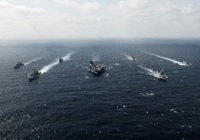The United States and the Republic of Korea (ROK) have one of the most formidable and durable military alliances in the world. This alliance has preserved peace and stability in Northeast Asia and ensured nuclear restraint among Asian powers. It has weathered extreme domestic unpopularity in South Korea and pressures in Washington to reduce U.S. overseas defense obligations. During the lifetime of this military alliance, the junior partner has transformed from a war-battered, backward military dictatorship into a prosperous democracy with the world's most-wired population and one of the world's largest economies. Most American and Korean strategists agree that the value of the alliance goes far beyond security on the Korean peninsula. Yet, the contours of the U.S.-ROK alliance's future are elusive. Cooperation on the Korean peninsula itself often brings the partners into conflict, most often with Seoul seeking a more conciliatory stance toward Pyongyang than Washington prefers. Can two partners so often at odds on their most proximate and pressing challenge really expand their cooperation effectively? Some analysts also warn of alliance creep. Would continuing the military alliance be a costly strategic error based more on nostalgia than a sober assessment of both sides' national security needs? Finally, although it has made tremendous strides, South Korea is a young and populist democracy and a relative newcomer to the world stage. Is the ROK ready to take on a greater role in the Asia Pacific and beyond, in ways that support mutual U.S. and South Korean interests? Asia is one foreign policy area in which the United States has scored well over the past eight years, in part because a broad and pragmatic center remains dominant in America's Asia policy community. Similarly, strong bipartisan commitment to the U.S.-Korea alliance has been and will continue to be critical in order to strengthen the relationship.
Going Global: The Future of the U.S.-South Korea Alliance

